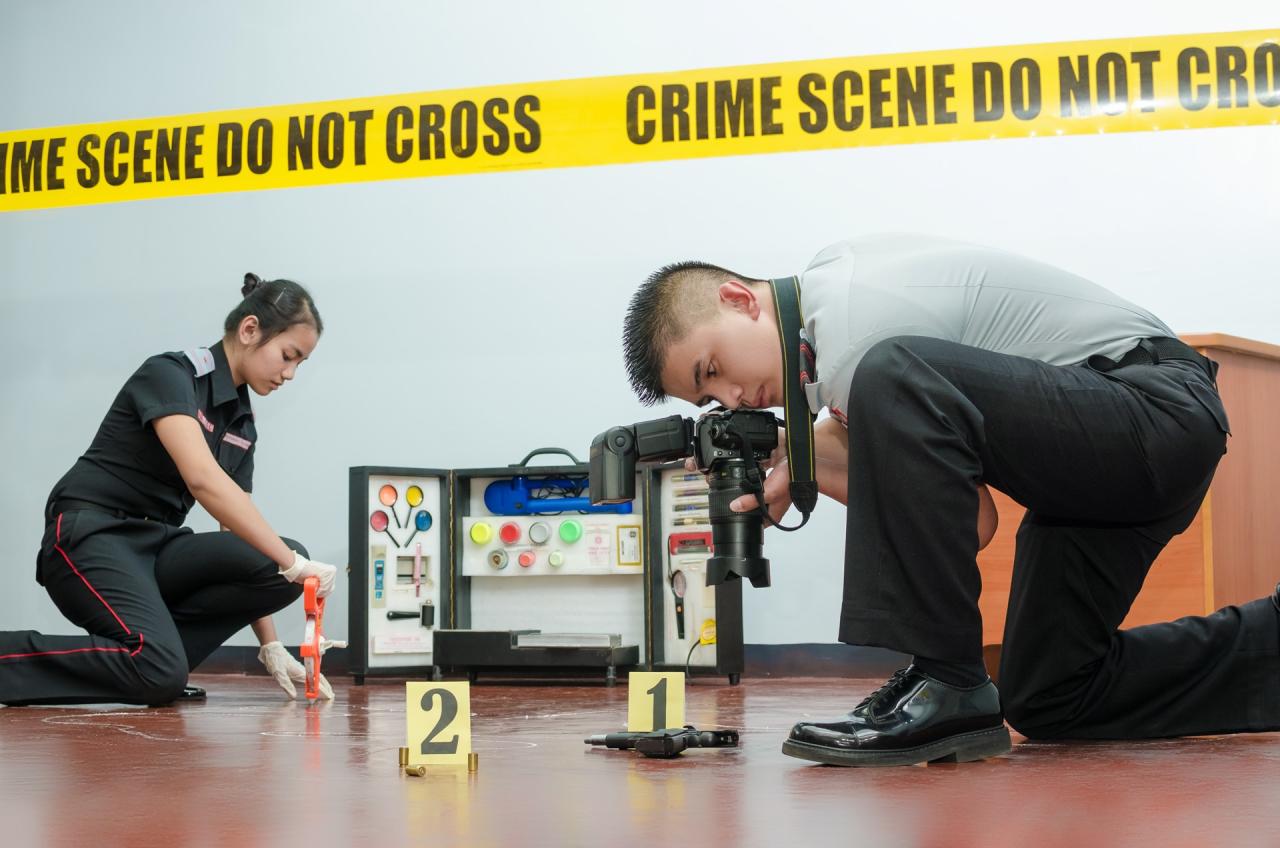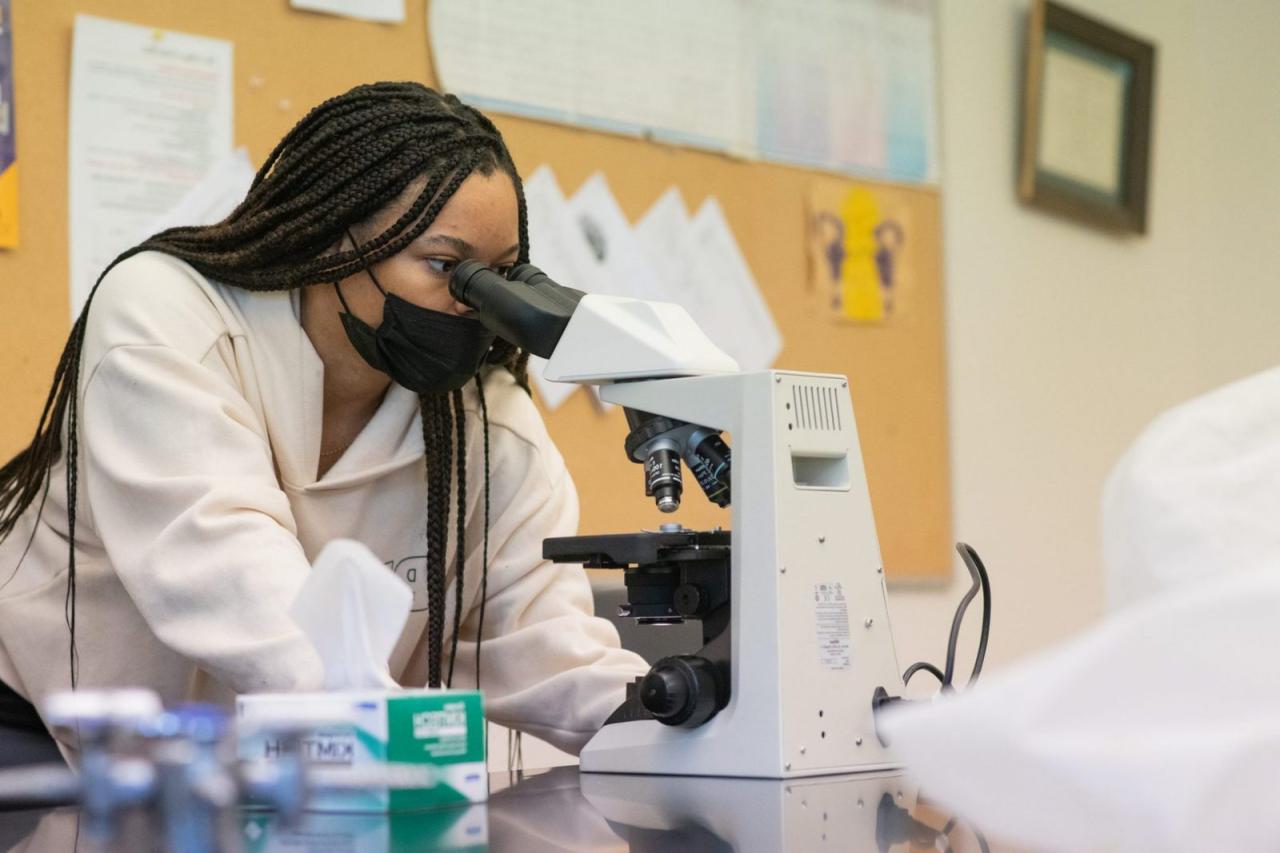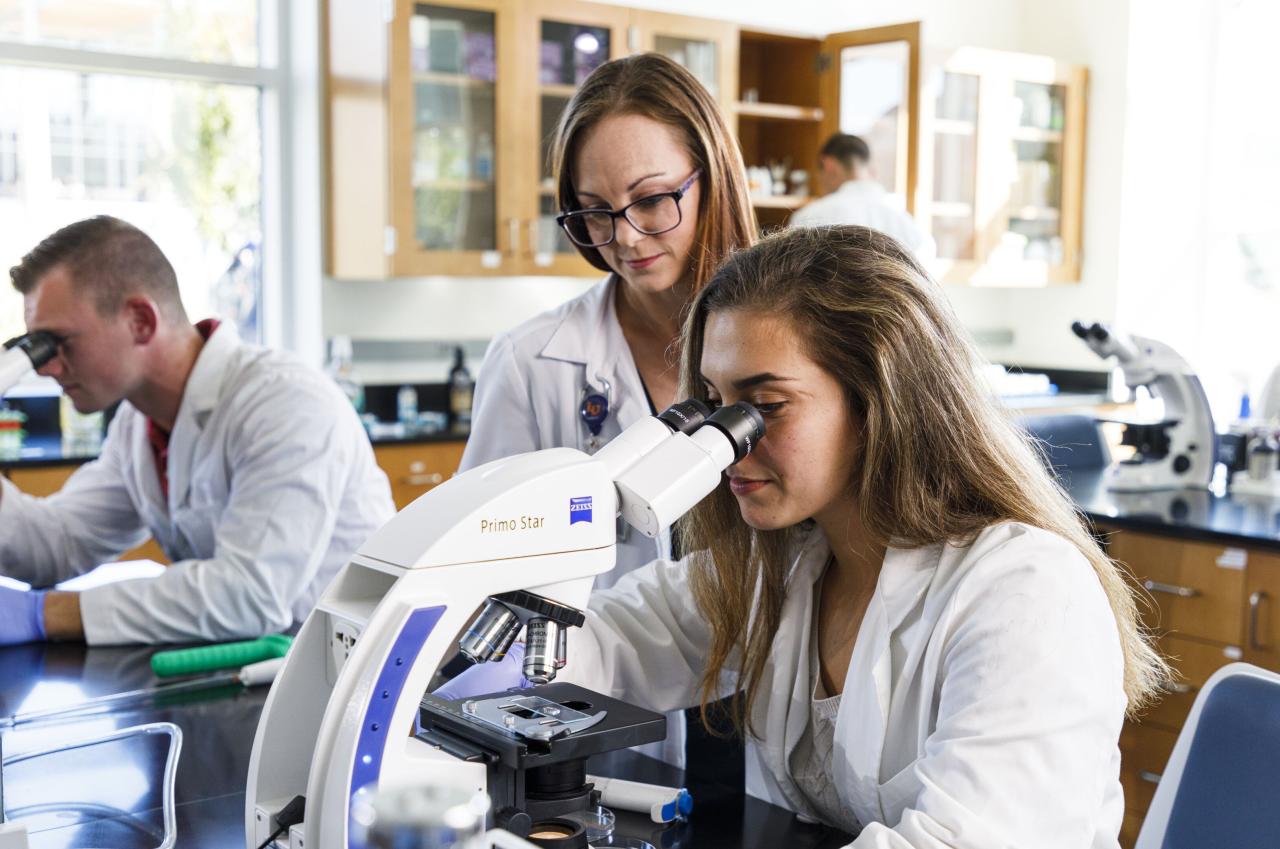A forensic science bachelor degree opens doors to a fascinating world of crime investigation, where scientific principles meet the intricacies of the legal system. This degree equips individuals with the knowledge and skills to analyze evidence, solve puzzles, and contribute to the pursuit of justice.
From understanding the fundamentals of forensic science to delving into specialized areas like DNA analysis, toxicology, or ballistics, a forensic science bachelor degree provides a comprehensive foundation. Students engage in hands-on laboratory work, honing their analytical skills and developing a keen eye for detail.
Introduction to Forensic Science: Forensic Science Bachelor Degree

Forensic science is a multidisciplinary field that applies scientific principles and techniques to investigate and solve crimes. It plays a crucial role in the legal system by providing objective evidence that can help determine guilt or innocence.
Forensic scientists use a variety of techniques and technologies to analyze evidence, including DNA analysis, fingerprint identification, ballistics analysis, and toxicology. Their findings can help reconstruct events, identify suspects, and provide valuable information for prosecutors and defense attorneys.
Branches of Forensic Science
Forensic science encompasses a wide range of specialized fields. These branches work together to provide a comprehensive understanding of the crime scene and the events that transpired.
- Forensic Biology: This branch focuses on the analysis of biological evidence, such as blood, tissue, and DNA. It plays a crucial role in identifying victims and suspects, establishing relationships between individuals, and determining the cause of death.
- Forensic Chemistry: Forensic chemists analyze non-biological evidence, such as drugs, explosives, and paint. They use a variety of techniques to identify and quantify substances, determine their origin, and link them to the crime scene or suspect.
- Forensic Anthropology: Forensic anthropologists specialize in the identification and analysis of human skeletal remains. They can determine the age, sex, race, and stature of an individual, and can also identify signs of trauma or disease.
- Forensic Entomology: Forensic entomologists study insects and their role in the decomposition process. They can estimate the time of death based on the insect species present and their stage of development.
- Forensic Pathology: Forensic pathologists perform autopsies to determine the cause and manner of death. They examine the body for injuries, diseases, and other factors that may have contributed to the death.
- Forensic Toxicology: Forensic toxicologists analyze biological samples for the presence of drugs, poisons, and other substances. They can determine the level of intoxication, identify the substance involved, and establish the time of exposure.
- Forensic Engineering: Forensic engineers investigate accidents and failures. They use their expertise to determine the cause of the accident, identify design flaws, and assess the safety of products and systems.
- Forensic Psychology: Forensic psychologists study the behavior of criminals and victims. They provide expert testimony on issues such as competency to stand trial, criminal profiling, and witness credibility.
History and Evolution of Forensic Science, Forensic science bachelor degree
The history of forensic science dates back to ancient times. Early civilizations developed techniques for identifying individuals and determining the cause of death.
- Ancient China: One of the earliest examples of forensic science can be traced back to the 13th century in China. A book titled “洗冤录” (The Washing Away of Wrongs) by Song Ci, a renowned forensic expert, detailed various methods for investigating crime scenes, including the use of fingerprints and the examination of wounds.
- Medieval Europe: During the Middle Ages, forensic science began to emerge as a distinct field. The development of the microscope in the 17th century allowed for the examination of minute details, leading to advances in the analysis of evidence.
- 19th Century: The 19th century saw significant advancements in forensic science, including the development of techniques for fingerprint identification, ballistics analysis, and toxicology. The work of scientists like Alphonse Bertillon and Edmond Locard laid the foundation for modern forensic science.
- 20th Century: The 20th century witnessed the rise of forensic science as a vital tool in criminal justice. The development of DNA profiling in the 1980s revolutionized the field, providing a powerful tool for identifying suspects and exonerating the innocent.
Curriculum and Coursework
A forensic science bachelor’s degree program equips students with a comprehensive understanding of scientific principles and their application in legal investigations. The curriculum encompasses a wide range of subjects, including core courses in natural sciences, criminal justice, and specialized forensic disciplines.
Students will gain a strong foundation in scientific methodologies, analytical techniques, and legal procedures. This knowledge is essential for effectively collecting, analyzing, and interpreting evidence in criminal investigations. The program emphasizes hands-on experience through laboratory work, practical exercises, and simulations, preparing students for the demands of real-world forensic investigations.
Core Courses
The core courses in a forensic science bachelor’s degree program provide a broad foundation in the scientific principles and techniques essential for forensic investigations. These courses typically include:
- Biology: This course covers fundamental biological principles, including cell structure, genetics, and molecular biology, which are essential for understanding DNA analysis, bloodstain pattern analysis, and other biological evidence.
- Chemistry: Chemistry courses cover the fundamental principles of chemical reactions, analytical techniques, and the properties of matter, which are crucial for analyzing drugs, explosives, and other chemical substances found at crime scenes.
- Physics: Physics courses provide an understanding of the laws of motion, energy, and matter, which are essential for analyzing ballistics, impact patterns, and other physical evidence.
- Statistics: Statistics courses introduce students to data analysis, probability, and statistical inference, which are crucial for interpreting forensic data and drawing valid conclusions.
- Criminal Justice: This course explores the legal framework surrounding criminal investigations, including the criminal justice system, evidence admissibility, and legal procedures.
Specialized Courses
In addition to core courses, forensic science programs offer specialized courses that delve deeper into specific branches of forensic science. These courses provide students with in-depth knowledge and practical skills in specific areas of expertise. Here are some examples:
- Forensic Biology: This course focuses on the analysis of biological evidence, such as blood, DNA, and tissue samples, using techniques like DNA profiling and bloodstain pattern analysis.
- Forensic Chemistry: This course covers the analysis of chemical substances found at crime scenes, such as drugs, explosives, and poisons, using techniques like gas chromatography-mass spectrometry (GC-MS) and high-performance liquid chromatography (HPLC).
- Forensic Toxicology: This course focuses on the analysis of drugs and poisons in biological samples, such as blood and urine, to determine the cause of death or intoxication.
- Forensic Anthropology: This course focuses on the identification and analysis of human skeletal remains, including age, sex, and cause of death, to assist in criminal investigations.
- Forensic Entomology: This course studies the use of insects in criminal investigations, including estimating time of death based on insect activity and identifying the location of a crime scene.
- Forensic Photography: This course teaches students how to document crime scenes and evidence using specialized photographic techniques, including close-up photography, infrared photography, and digital imaging.
- Forensic Psychology: This course explores the psychological aspects of criminal behavior, including profiling, eyewitness testimony, and criminal investigations.
Hands-on Experience and Laboratory Work
Hands-on experience is crucial for developing practical skills and applying theoretical knowledge to real-world scenarios. Forensic science programs emphasize laboratory work, practical exercises, and simulations to provide students with opportunities to work with forensic equipment and techniques. Examples of laboratory work include:
- DNA Analysis: Students learn how to extract, amplify, and analyze DNA samples using polymerase chain reaction (PCR) and electrophoresis techniques.
- Bloodstain Pattern Analysis: Students learn how to interpret bloodstain patterns at crime scenes to determine the sequence of events, the type of weapon used, and the position of the victim and the assailant.
- Fingerprint Analysis: Students learn how to lift, develop, and compare fingerprints using various techniques, such as dusting, fuming, and chemical enhancement.
- Firearms Examination: Students learn how to examine firearms and ammunition, including identifying the type of weapon used, determining the trajectory of bullets, and comparing bullets and shell casings.
- Drug Analysis: Students learn how to identify and analyze drugs using various techniques, such as color tests, microcrystalline tests, and instrumental analysis.
Skills and Qualities for Success

A successful career in forensic science demands a unique blend of intellectual prowess, practical skills, and personal attributes. Beyond a strong foundation in science and a passion for solving puzzles, aspiring forensic scientists must cultivate a set of skills and qualities that enable them to excel in this challenging and rewarding field.
Critical Thinking, Analytical Skills, and Attention to Detail
Critical thinking, analytical skills, and attention to detail are the cornerstones of effective forensic analysis. These skills allow forensic scientists to meticulously examine evidence, identify patterns, draw logical conclusions, and construct compelling arguments.
- Critical Thinking: Forensic scientists must be able to objectively analyze evidence, separating facts from assumptions and biases. This involves questioning the validity of information, considering alternative explanations, and evaluating the strength of evidence. For example, when examining a crime scene, a forensic scientist must critically evaluate the position of objects, the presence of traces of evidence, and the potential for contamination to form a comprehensive understanding of the events that occurred.
- Analytical Skills: Forensic science relies heavily on analytical skills. Scientists must be able to break down complex problems into smaller, manageable components, analyze data systematically, and interpret results accurately. This includes using sophisticated analytical techniques, such as chromatography, spectroscopy, and DNA profiling, to identify and analyze substances and materials found at crime scenes.
- Attention to Detail: Forensic scientists must possess an exceptional ability to notice subtle details that others might overlook. This meticulousness is crucial for identifying minute traces of evidence, such as fingerprints, fibers, or DNA, which can play a vital role in solving crimes. For instance, a forensic entomologist might carefully examine the insects found on a body to estimate the time of death.
Teamwork, Communication, and Ethical Considerations
Forensic science is rarely a solitary endeavor. Effective teamwork, clear communication, and adherence to ethical principles are essential for success in this field.
- Teamwork: Forensic scientists often work in multidisciplinary teams, collaborating with other professionals, such as police officers, medical examiners, and other specialists. Effective teamwork involves open communication, shared decision-making, and a willingness to learn from others’ expertise. For example, a forensic chemist might work closely with a ballistics expert to analyze gunshot residue and determine the type of weapon used in a crime.
- Communication: Forensic scientists must be able to communicate their findings clearly and concisely, both verbally and in writing. This involves presenting complex scientific information in a way that is understandable to non-scientists, such as judges, juries, and the general public. Effective communication is essential for presenting evidence in court, educating the public about forensic science, and collaborating with other professionals.
- Ethical Considerations: Forensic science carries significant ethical responsibilities. Scientists must adhere to strict ethical guidelines to ensure the integrity of their work and the fair administration of justice. This includes maintaining objectivity, avoiding bias, and protecting the confidentiality of evidence and client information. For example, forensic scientists must be careful not to contaminate evidence, avoid tampering with samples, and report their findings honestly and accurately.
Ultimate Conclusion

With a forensic science bachelor degree, you’ll be prepared to embark on a rewarding career path, contributing to the complex world of crime investigation. Whether you choose to work in a laboratory, at a crime scene, or in a courtroom, your skills and knowledge will be invaluable in ensuring justice prevails.
User Queries
What are the job prospects for forensic science graduates?
Forensic science graduates have diverse career options, including forensic scientists, crime scene investigators, forensic analysts, and forensic pathologists.
Is there a specific certification required for forensic science professionals?
While not always mandatory, professional certifications, such as the American Board of Criminalistics (ABC) certification, can enhance career prospects and demonstrate expertise.
What are the key skills needed for a career in forensic science?
Critical thinking, analytical skills, attention to detail, problem-solving abilities, and strong communication skills are essential for success in forensic science.
